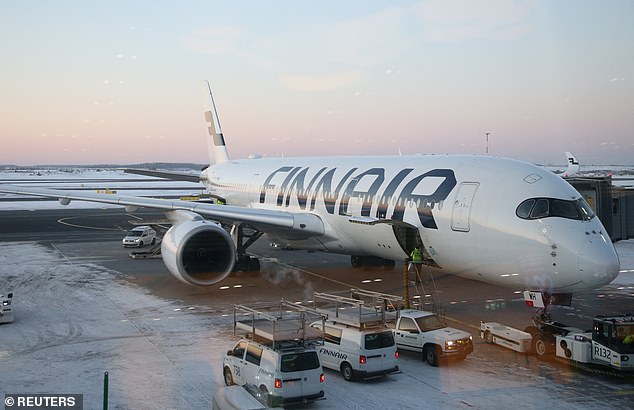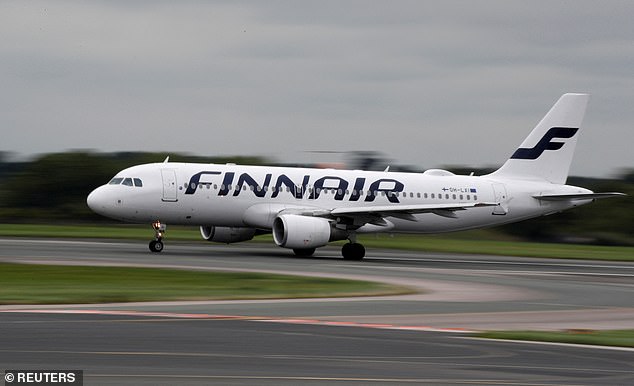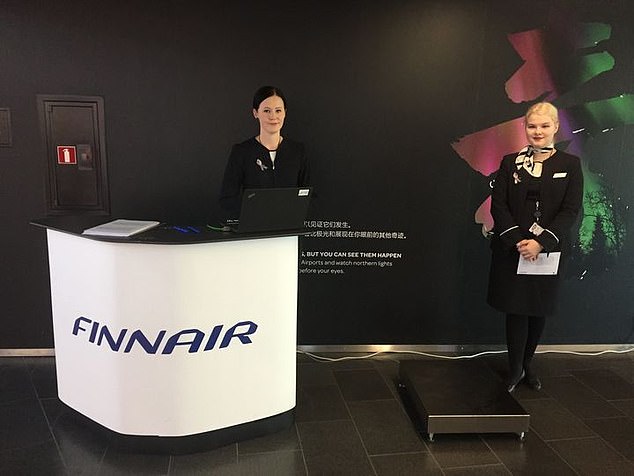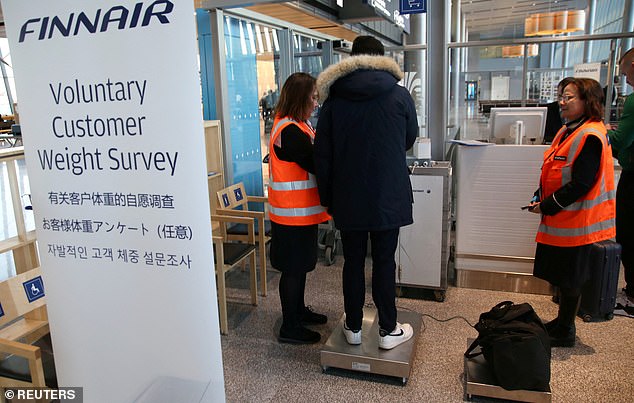A Finnish airline has begun its controversial plan to weigh passengers before taking off, a move that has been heavily criticized as embarrassing.
European airline Finnair has started its voluntary program of weighing passengers at departure gates at Helsinki Airport, which it says will allow airlines to better calculate aircraft weight estimates before takeoff.
The first passengers were seen standing on a scale at the airport, next to a large sign that read: “Voluntary Customer Weight Survey.”
Finnair says the scheme is necessary to understand the weight a location carries on a given journey, which can fluctuate wildly depending on where in the world you are and what time of year the flight takes place.
A spokesperson previously told MailOnline that the plan would obtain “accurate data for aircraft performance and balance calculations” that are “necessary for the safe operation of flights”, rather than relying on standard European weights.
The first passengers are seen being weighed as part of the voluntary program

The airline says so far more than 800 people have agreed to be weighed

Finnair says the move will help provide better data for flights, which will improve safety.
A communications director previously said that Finns, for example, tend to wear heavier clothing in the colder months.
“This is part of having a very strong safety culture in our organization,” they said.
‘We want to see if the data we use for calculations is accurate. We use them for every flight and they are important for the performance of the aircraft.
“When you explain this (to passengers), they understand.”
And engineers have backed the “long-awaited” move, saying airlines must have the most up-to-date data to increase flight safety.

Finnair insists the measures are aimed at obtaining better averages that they can use to fly more safely.

A Finnish airline made headlines for a week-long policy that involved weighing passengers
A former USAF engineer told MailOnline: ‘Airline estimates of weight and weight distribution on aircraft are very important for flight safety. The weights are assumed based on (averages) from decades ago.
“The bottom line is that people are much bigger and heavier than they were decades ago.”
He said overloaded planes were “flying blind” without up-to-date information, which he warned was “extremely dangerous”.
But frequent flyers warn that policies should not overstep their bounds, arguing that weighing passengers for safety reasons could be “humiliating” for some who could be left “particularly vulnerable to discrimination.”
Speaking to MailOnline today, travel and consumer rights journalist Laura Sanders said: “Relying on averages could become less accurate as planes are packed to the brim and we could see more cases where passengers are asked to get off the plane to reduce weight.
“Weighing passengers and their luggage before each flight to manage weight distribution at an individual level rather than relying on averages is sensible, but if you are weighed at the gate, it is already too late and a huge inconvenience if you are asked no”. fly to avoid tipping the scales (not to mention embarrassing).
“This could leave overweight people and solo travelers particularly vulnerable to discrimination, as they are the easiest to eliminate (families and friends will want to stay together).”
He suggested that airlines considering weighing passengers could require them to enter their weight at the time of booking the flight to support safety directives without exposing travelers to humiliation.
Finnair told MailOnline that the decision to weigh the volunteers came in 2017 when they opted to use their own guidance measurements rather than relying on the European Aviation Safety Authority (EASA) standard weights.
These estimate that the average man weighs 88 kg and the average woman 70 kg.
Finnair’s current standard weights, based on its own testing, reveal that men weigh, on average, 96 kg, while women weigh 76 kg. They point out that this varies depending on the season and the route.
So far, the company said, more than 800 people have voluntarily weighed themselves, adding that it was “positively surprised by the number of volunteers.”
Finnair is not the first airline to take the initiative and measure passenger weight themselves.
In August last year, Korea’s largest airline, Korean Air, announced that it would begin weighing passengers at Gimpo Airport on domestic routes and at Incheon Airport on international flights for a short period until September.
The company said the move was aimed at reducing fuel waste and helping more accurately estimate the plane’s weight.
It is unclear whether other airlines have similar plans to weigh their passengers.


